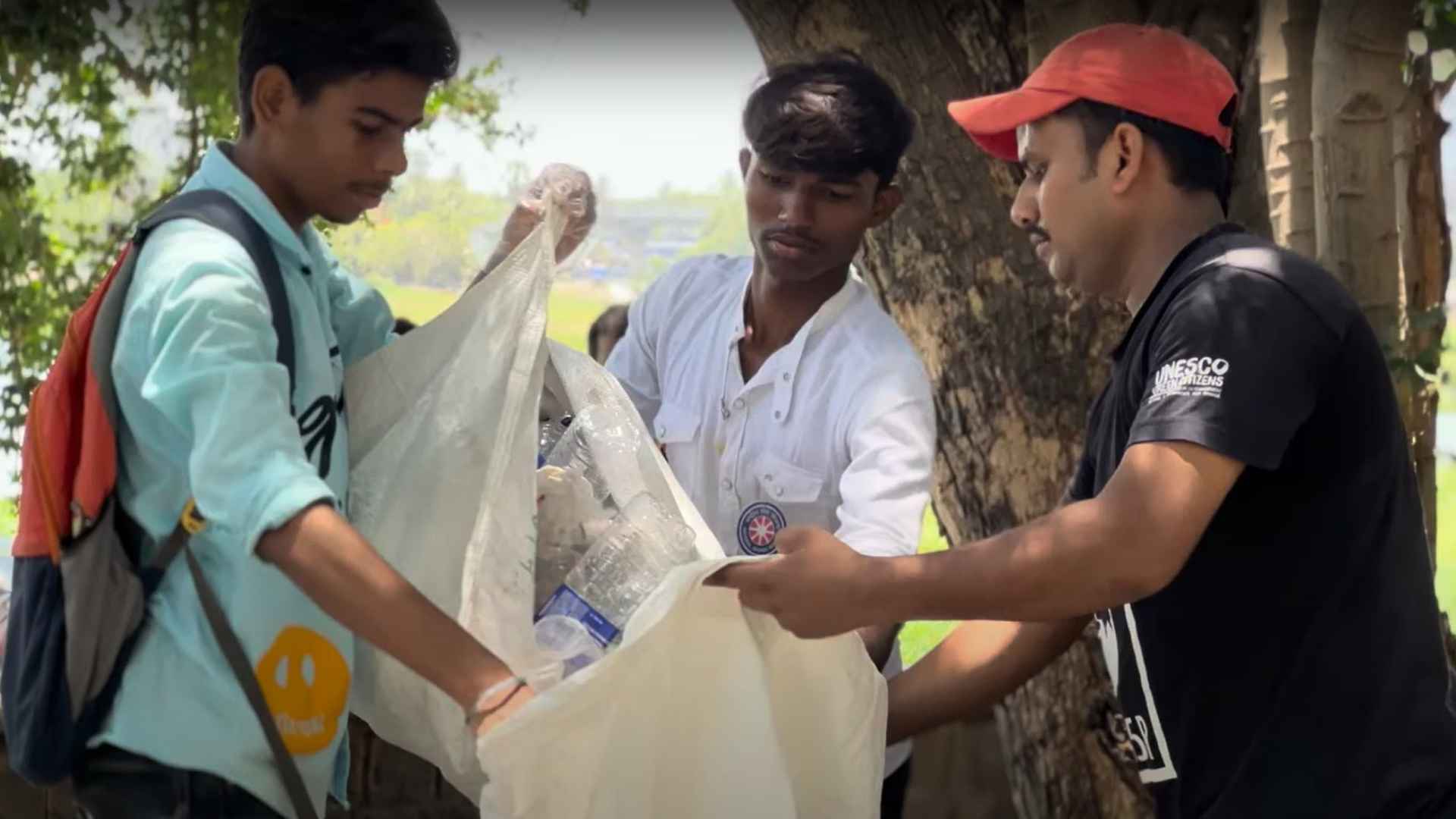Urban waste management has emerged as a critical global challenge, with cities generating millions of tons of waste daily. Rapid urbanization, population growth, and changing consumption patterns have exacerbated the waste crisis, leading to environmental degradation, public health concerns, and economic burdens.
Without effective waste management systems, landfills overflow, toxic emissions increase, and valuable resources go to waste instead of being recovered and reused. Municipalities play a central role in waste management, responsible for collection, disposal, and recycling efforts. However, they often face significant challenges such as inadequate infrastructure, limited funding, policy gaps, and low public participation.
Many municipalities still rely on inefficient linear waste management models that prioritize disposal over resource recovery, resulting in unsustainable waste accumulation. Earth5R’s End-to-End Urban Waste Management Blueprint presents a structured, research-driven solution designed to tackle these challenges holistically.
By integrating circular economy principles, digital tracking tools, and community participation models, this blueprint offers a scalable and sustainable approach to urban waste management. Collaboration and innovation are key to transforming waste management systems. Municipalities must engage with private enterprises, citizen groups, and technology-driven solutions to build resilient, waste-smart cities. Implementing Earth5R’s blueprint through cooperative efforts can drive long-term environmental and economic benefits.
Understanding the Urban Waste Crisis
Urban waste generation has reached unprecedented levels, with global municipal solid waste (MSW) production estimated at 2.01 billion tons annually. According to the World Bank, this figure is expected to rise to 3.40 billion tons by 2050, with low- and middle-income countries experiencing the most significant increase.
The rapid growth of urban populations, coupled with rising consumerism, has placed immense pressure on waste management systems worldwide. The failure to manage waste effectively has profound environmental, social, and economic consequences. Environmentally, landfills and open dumping sites release greenhouse gases like methane, contributing to climate change.
Plastic waste pollutes oceans, harming marine life, while toxic leachate from unmanaged waste contaminates soil and groundwater. Socially, improper waste disposal leads to health hazards such as respiratory diseases, waterborne illnesses, and vector-borne infections, disproportionately affecting vulnerable communities.
Economically, waste mismanagement increases municipal costs, reduces property values, and leads to lost economic opportunities in recycling and waste-to-energy industries. Several cities worldwide serve as cautionary tales of ineffective waste management.
Delhi, India, generates over 11,000 tons of waste daily, much of which ends up in overburdened landfills like Ghazipur, which have exceeded their capacity and frequently catch fire, causing severe air pollution. Jakarta, Indonesia, struggles with plastic waste clogging its rivers, leading to floods and environmental hazards. In Lagos, Nigeria, inefficient waste collection has resulted in illegal dumping, exacerbating flooding and public health crises.
Addressing the urban waste crisis requires immediate intervention, innovative strategies, and multi-stakeholder collaboration. Municipalities must transition from outdated disposal-centric models to circular and sustainable waste management approaches that prioritize reduction, recycling, and resource recovery. Earth5R’s End-to-End Urban Waste Management Blueprint offers a data-driven, scalable solution to help cities tackle this growing challenge effectively.
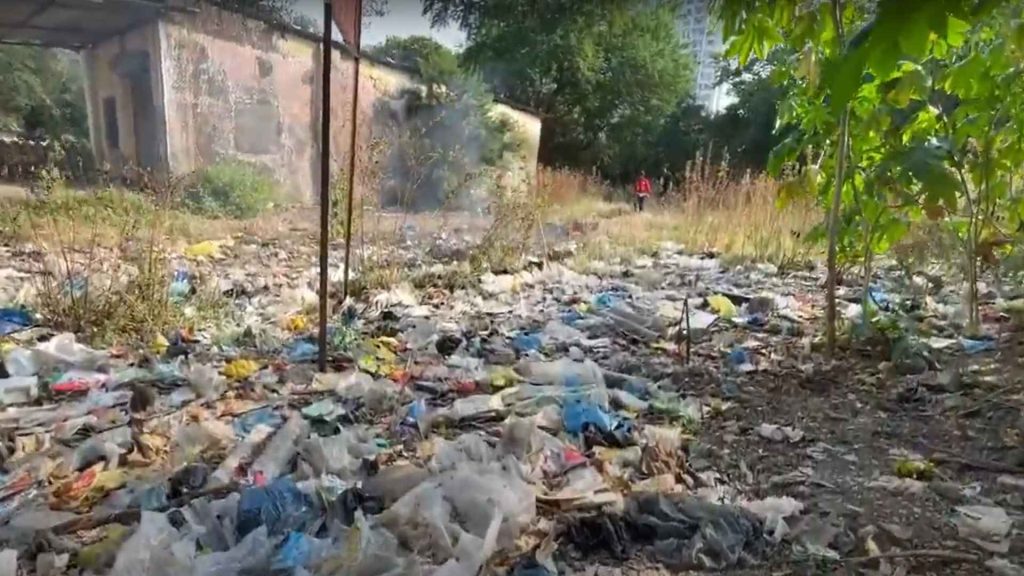
The Role of Municipalities in Waste Management
Municipalities play a critical role in urban waste management, overseeing waste collection, segregation, transportation, treatment, and disposal. They are responsible for ensuring that waste management systems function efficiently while minimizing environmental and health hazards.
In many cities, local governments also regulate waste-related businesses, enforce compliance with waste disposal laws, and promote community awareness programs. A well-structured municipal waste management system is essential to maintaining clean, livable, and sustainable urban environments.
Policy Frameworks and Legal Mandates
Waste management is governed by a range of local, national, and international policies designed to ensure sustainable waste handling practices. Many countries have adopted Extended Producer Responsibility (EPR) frameworks, requiring manufacturers to take responsibility for post-consumer waste, particularly for plastics and electronic waste.
The European Union’s Circular Economy Action Plan, India’s Solid Waste Management Rules (2016), and the United States’ Resource Conservation and Recovery Act (RCRA) are examples of policies aimed at reducing landfill dependency and increasing recycling. Additionally, global treaties like the Basel Convention regulate the movement of hazardous waste across borders to prevent environmental dumping.
Despite these regulations, enforcement remains a challenge, particularly in low-and middle-income countries where governance structures are weak, and illegal waste disposal is rampant. Municipalities often lack the capacity to monitor compliance effectively, leading to widespread violations and ineffective waste management practices.
Challenges Municipalities Face
Budget Constraints
Waste management is resource-intensive, requiring significant financial investment in infrastructure, workforce, and technology. In many cities, especially in the Global South, municipalities operate on limited budgets, making it difficult to expand services, upgrade facilities, or invest in sustainable solutions like composting and recycling plants. Often, funding is heavily skewed toward waste collection rather than waste processing and resource recovery.
Infrastructure Gaps
Many urban areas lack adequate infrastructure for waste segregation, treatment, and recycling. Outdated landfill sites continue to be the primary waste disposal method, despite their environmental risks. Furthermore, improper road networks and inefficient logistics systems hinder timely waste collection, leading to uncollected waste piling up in streets and waterways.
Public Engagement Issues
Municipal waste management success relies heavily on community participation, yet many cities struggle with low public awareness and engagement. Households and businesses often fail to segregate waste properly due to a lack of knowledge or inconvenience. Furthermore, informal waste pickers—who play a crucial role in recycling—are often excluded from municipal waste management frameworks, reducing overall efficiency.
The Need for an Integrated Approach
To overcome these challenges, municipalities must adopt innovative, collaborative, and technology-driven solutions. Earth5R’s End-to-End Urban Waste Management Blueprint provides a research-backed framework that helps cities optimize waste collection, improve resource recovery, and promote circular economy principles. By leveraging public-private partnerships, digital monitoring systems, and community-driven initiatives, municipalities can transform waste management into a sustainable and economically viable sector.
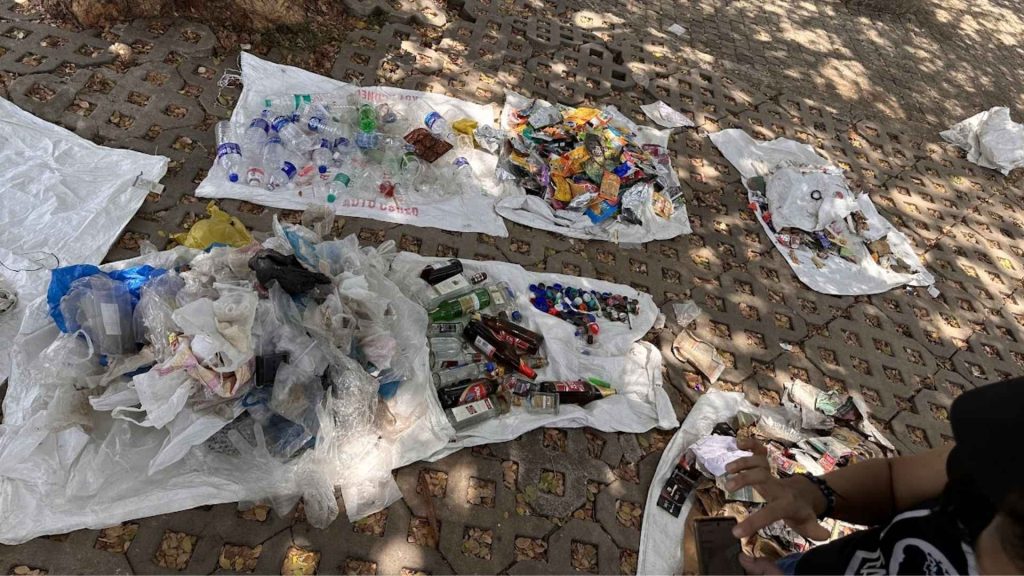
Earth5R’s End-to-End Urban Waste Management Blueprint
Earth5R’s End-to-End Urban Waste Management Blueprint is a structured, research-driven framework designed to help municipalities create sustainable, efficient, and economically viable waste management systems. The blueprint integrates circular economy principles, technological innovations, and community participation models to address urban waste challenges holistically.
The objective is to transform waste from a problem into a valuable resource, reducing landfill dependency and promoting environmental and social well-being. The blueprint operates on the principles of waste minimization, resource recovery, and collaborative governance, ensuring that urban waste is managed scientifically and sustainably. Below are its key components:
Waste Segregation at Source
Proper waste segregation is the foundation of efficient waste management, ensuring that waste is processed in the most sustainable manner. The blueprint emphasizes the separation of household and institutional waste into biodegradable, recyclable, hazardous, and non-recyclable categories to facilitate efficient disposal and resource recovery.
To promote source segregation, municipalities can implement door-to-door awareness programs and offer incentives to encourage citizen participation. Additionally, integrating informal waste workers, such as ragpickers and recyclers, into the formal waste management system enhances collection efficiency and increases material recovery rates. Effective segregation reduces landfill burden, boosts recycling and composting efforts, and improves waste-to-energy conversion, leading to a more sustainable urban waste management system.
Circular Economy Integration
Earth5R’s model aligns with the circular economy approach, where waste is treated as a resource rather than being discarded. The blueprint promotes recycling and upcycling programs to recover valuable materials like plastics, metals, and paper, ensuring they are reintroduced into the production cycle. Likewise, organic waste composting helps create bio-fertilizers, reducing reliance on chemical alternatives and improving soil health.
To further optimize waste utilization, the model supports waste-to-energy projects, including biogas plants and incineration with energy recovery, which convert waste into usable power. Collaboration with industries is also a key aspect, encouraging the design of products with sustainable materials and enforcing Extended Producer Responsibility (EPR) frameworks to hold manufacturers accountable for post-consumer waste.
By closing the resource loop, this approach helps cities reduce landfill dependency, conserve natural resources, and generate economic value from waste, transforming urban waste management into a sustainable and profitable system.
Community-Driven Waste Management Models
Engaging communities is essential for sustainable waste management, and Earth5R’s blueprint emphasizes a people-centric approach to drive long-term behavioral change. It integrates citizen participation initiatives, such as community composting, waste audits, and zero-waste neighborhoods, to encourage local involvement in waste reduction efforts.
In addition, educational programs play a key role in promoting responsible consumption and waste minimization practices, ensuring that individuals understand their role in the waste management ecosystem. The blueprint also advocates for the inclusion of informal waste workers, empowering them through training, fair wages, and legal recognition, which enhances both social equity and waste collection efficiency.
By fostering active community engagement, this approach improves compliance, reduces littering, and cultivates a culture of environmental responsibility, making urban waste management more effective and sustainable.
Digital Tracking and Monitoring Tools
Technology plays a vital role in enhancing waste management efficiency, and Earth5R’s blueprint integrates digital innovations to optimize waste collection and processing. Smart waste bins equipped with sensors notify collection teams when full, ensuring timely pickups and preventing overflow. As well, GPS-enabled waste collection systems help optimize routes, reducing fuel consumption and operational costs.
To improve transparency and accountability, blockchain-based tracking systems monitor waste movement from collection to recycling, preventing illegal dumping and ensuring compliance. Furthermore, mobile apps enable citizens to report waste-related issues and track their waste segregation practices, fostering greater public participation. By leveraging these digital tools, the blueprint enhances accountability, reduces inefficiencies, and promotes data-driven decision-making, making urban waste management more effective and sustainable.
Public-Private Partnerships (PPPs)
Collaboration between municipalities, private enterprises, and NGOs can significantly enhance the impact of waste management efforts, and Earth5R’s blueprint emphasizes Public-Private Partnerships (PPPs) as a key driver of efficiency and scalability. The model encourages corporate engagement through CSR programs that support waste management infrastructure, providing essential funding and resources.
In addition, fostering start-up incubators for waste recycling and circular economy enterprises helps drive innovation and create sustainable business models in the waste sector. The blueprint also highlights the importance of investment in green technologies, such as AI-driven waste sorting systems and automated recycling plants, to improve efficiency and reduce reliance on manual labor.
Furthermore, municipal contracts with private companies ensure better waste collection, treatment, and resource recovery, bridging existing infrastructure gaps. By integrating these collaborative efforts, PPPs bring in funding, expertise, and innovation, making urban waste management more effective, sustainable, and scalable.
Earth5R’s End-to-End Urban Waste Management Blueprint provides a science-backed, action-oriented roadmap for municipalities. By integrating segregation, circular economy principles, community participation, digital monitoring, and private-sector engagement, cities can transition to sustainable, low-waste urban ecosystems. Collaboration and innovation remain the key drivers for achieving a cleaner, waste-resilient future.
Case Studies & Research Evidence
Earth5R’s End-to-End Urban Waste Management Blueprint has been successfully implemented in multiple cities, demonstrating measurable improvements in waste reduction, resource recovery, and community engagement. This section presents case studies of cities where the model has been applied, research-backed data on its effectiveness, and a comparative analysis of Earth5R’s approach versus conventional waste management systems.
Case Studies of Earth5R’s Model in Action
Mumbai, a city generating over 11,000 tons of waste daily, has long struggled with landfill overflow and inefficient waste collection systems. To address these challenges, Earth5R collaborated with local municipalities to implement a community-driven waste management model in several housing societies, focusing on source segregation, composting, and recycling.
This initiative led to over 80% waste segregation compliance in pilot communities and a 60% reduction in landfill-bound waste through improved composting and recycling practices. Additionally, the integration of waste pickers into formal recycling operations enhanced efficiency while increasing their earnings, fostering both environmental and social benefits.
This project demonstrated that a combination of behavioral change programs and strong policy support can significantly improve urban waste management efficiency, setting a scalable model for other cities. Paris implemented Earth5R’s digital waste tracking system, integrating GPS-enabled waste collection and AI-based monitoring tools to enhance efficiency, reduce costs, and improve accountability.
This initiative led to a 25% reduction in fuel consumption by optimizing collection routes, while recycling rates increased by 30%, as data-driven insights improved sorting and processing. Besides, real-time monitoring and citizen reporting systems enhanced responsiveness to waste-related issues, ensuring quicker interventions and better service delivery.
The success of this technology-driven waste management approach in Paris demonstrated its ability to reduce inefficiencies, lower operational costs, and serve as a scalable model for other cities looking to modernize their waste management systems. Bogotá faced significant challenges with landfill overuse and illegal dumping, prompting Earth5R to facilitate a Public-Private Partnership (PPP) that invested in waste-to-energy (WTE) solutions.
This initiative successfully diverted 45% of organic waste from landfills to biogas plants, generating renewable energy sufficient to power 10,000 households annually. Likewise, it created over 500 green jobs in the waste-to-energy and recycling sectors. The Bogotá case demonstrates how PPP models can effectively mobilize financial investment and expertise to scale sustainable waste management solutions.
Research-Backed Data: Improved Waste Management Outcomes
Scientific research and data-driven evaluations consistently highlight the superior environmental and economic benefits of Earth5R’s model over conventional waste management. A study in Bangalore, India, found that community-based waste segregation programs increased recycling efficiency to 65%, compared to just 25% in non-participatory municipal programs.
In Bogotá, Life Cycle Assessments (LCA) of waste-to-energy plants showed a 40% reduction in carbon emissions compared to traditional landfill disposal. Additionally, digital tracking and AI-driven sorting in European cities reduced operational costs by 30%, underscoring the financial viability of technology-driven models. These findings reinforce the effectiveness of circular economy integration, community engagement, and technological interventions in transforming waste management systems.
Comparative Analysis: Earth5R vs. Conventional Waste Management
Earth5R’s structured and inclusive approach surpasses conventional waste management in efficiency, sustainability, and economic impact. Unlike traditional systems that rely on minimal segregation and mixed waste collection, leading to high landfill dependency and low resource recovery, Earth5R emphasizes source-segregation at the household level and circular economy practices to maximize recycling rates.
Its model significantly reduces carbon emissions and landfill burden while preventing groundwater contamination. Community involvement is also a key differentiator, as Earth5R actively engages citizens through waste audits and education programs, addressing the lack of awareness in conventional systems. Besides, the use of AI, GPS, and blockchain-based waste tracking enhances efficiency, replacing the manual and inefficient processes of traditional methods.
Economically, Earth5R’s integration of Public-Private Partnerships (PPPs) and waste-to-energy solutions ensures financial sustainability, unlike the high-cost, low-return nature of conventional waste management. The case studies and research evidence clearly indicate that Earth5R’s End-to-End Urban Waste Management Blueprint is a transformative solution for modern cities.
By integrating community participation, technology, and circular economy principles, this model has demonstrated measurable improvements in waste management efficiency, environmental sustainability, and economic viability. The results reinforce the need for municipal collaboration, policy support, and private sector investment to replicate and scale these successful interventions globally.
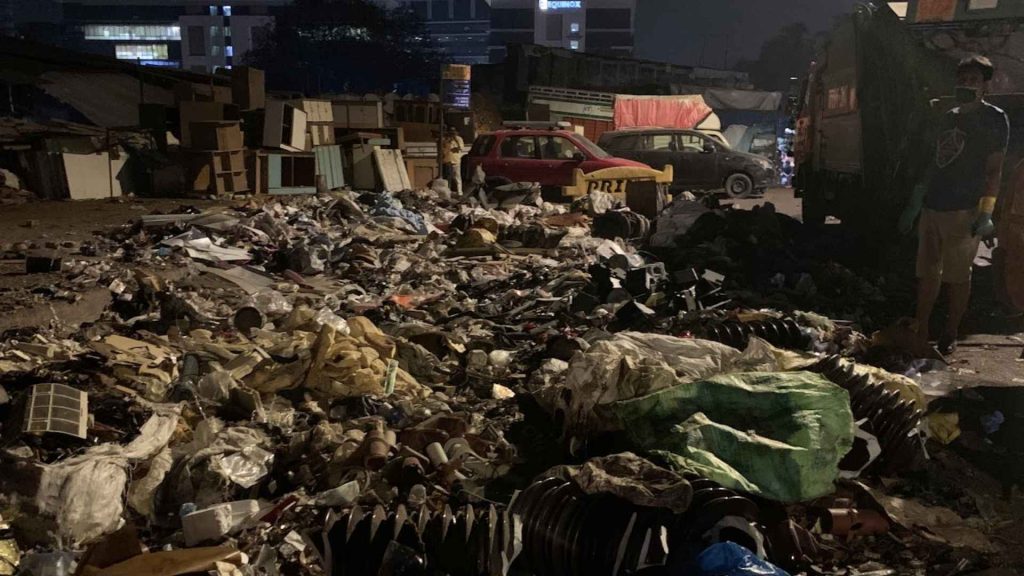
Strategies for Municipal Collaboration: Best Practices for Implementing Earth5R’s Blueprint
Municipalities play a pivotal role in ensuring sustainable waste management, and adopting Earth5R’s End-to-End Urban Waste Management Blueprint requires a strategic, collaborative, and technology-driven approach. By incentivizing citizen participation, leveraging data analytics, and fostering partnerships, municipalities can significantly enhance waste management efficiency and sustainability.
Incentivizing Citizen Participation and Behavioral Change
Engaging citizens in sustainable waste management is essential for long-term success. One of the most effective strategies is incentivizing participation through rewards, tax benefits, and community recognition programs. Municipalities can implement point-based reward systems, where households and businesses earn incentives for proper waste segregation, recycling, and composting. Digital platforms and mobile apps can facilitate these programs by tracking individual participation and offering discounts on utility bills or public services.
Awareness campaigns, workshops, and school programs also play a crucial role in behavioral change. Municipalities should collaborate with community organizations and educational institutions to integrate waste management education into local curriculums. Furthermore, conducting door-to-door awareness drives and organizing waste audit programs can encourage residents to adopt responsible waste disposal habits.
Policy measures, such as mandatory source segregation and fines for non-compliance, can reinforce positive behaviors. Municipalities can adopt a hybrid model, combining incentives and regulatory measures, to create a culture of waste responsibility among citizens.
Leveraging Technology and Data Analytics for Efficiency
The integration of technology is crucial for modernizing waste management and optimizing municipal resources. Implementing AI-driven waste sorting, GPS-enabled tracking systems, and blockchain-based waste auditing can enhance efficiency and transparency. AI-powered sorting systems improve recycling rates by automating the segregation process, ensuring higher-quality recyclables. GPS tracking of waste collection vehicles enables optimized route planning, reducing fuel consumption and operational costs.
Data analytics plays a crucial role in predicting waste generation patterns, assessing landfill capacities, and identifying high-waste zones. By analyzing data from IoT-enabled waste bins and citizen reporting platforms, municipalities can make data-driven decisions to improve collection frequency, allocate resources effectively, and reduce environmental impact.
Furthermore, digital platforms can facilitate real-time reporting and engagement, allowing citizens to report illegal dumping or overflowing bins. Blockchain technology can enhance accountability in waste management contracts, ensuring transparency in waste processing and recycling partnerships. Municipal collaboration is key to the successful implementation of Earth5R’s Blueprint.
By fostering citizen participation through incentives and education, and leveraging technology to enhance efficiency, municipalities can build resilient, sustainable waste management systems. A combination of policy enforcement, community engagement, and technological advancements will pave the way for an integrated circular economy, reducing landfill dependency and maximizing resource recovery.
Policy Recommendations & Future Roadmap
To effectively scale Earth5R’s End-to-End Urban Waste Management Blueprint, policy-level interventions must prioritize regulatory frameworks, financial incentives, and technological integration. By fostering innovation and embracing future trends, municipalities and governments can create a sustainable, circular waste management ecosystem.
Mandatory Source Segregation and Extended Producer Responsibility (EPR)
Governments must enforce mandatory waste segregation at the household and commercial levels, ensuring recyclables, organics, and non-recyclables are processed separately. Strengthening EPR policies can hold manufacturers accountable for sustainable packaging and waste take-back programs, reducing landfill dependency.
Incentive-Based Waste Management Policies
Financial incentives, such as tax reductions for businesses implementing zero-waste strategies or subsidies for households participating in composting programs, can drive behavioral change. Pay-as-you-throw (PAYT) schemes, where waste collection fees are based on the amount of non-recyclable waste generated, can further encourage responsible disposal.
Public-Private Partnerships (PPPs) for Infrastructure Development
Scaling Earth5R’s model requires significant investment in waste processing facilities, AI-driven sorting plants, and renewable energy projects. Governments should establish PPPs to attract private sector investment, ensuring the financial sustainability of waste-to-energy initiatives and recycling hubs.
Legislation for Technology Adoption in Waste Management
Governments should establish policies that encourage the integration of AI, blockchain, and IoT in waste management. Funding for smart waste collection systems and digital tracking platforms can optimize operations, enhance transparency, and improve overall efficiency.
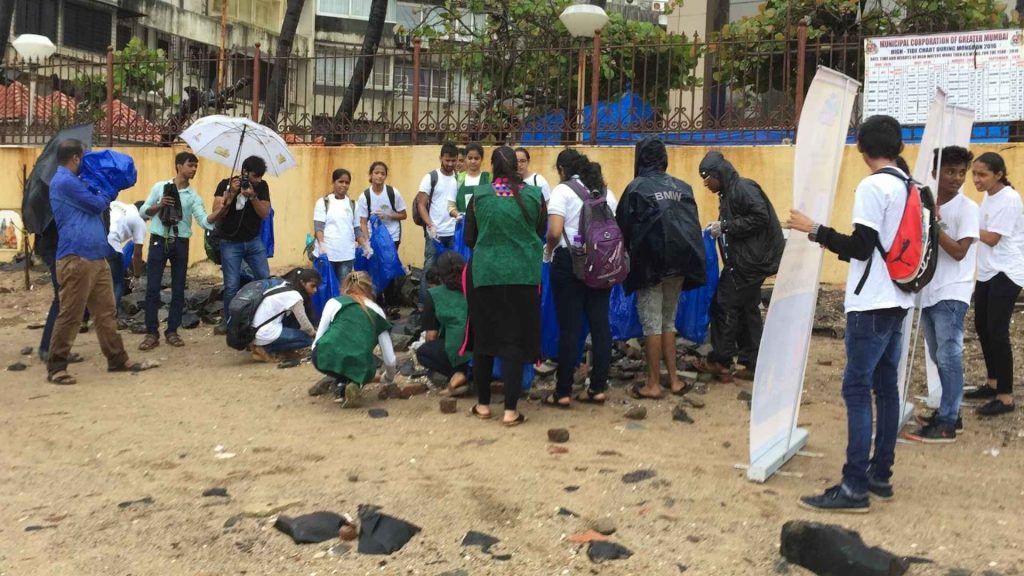
The Role of Innovation and Future Trends in Urban Waste Management
As cities expand, future waste management strategies must integrate emerging innovations to enhance efficiency and sustainability. AI and robotics in waste sorting can significantly improve precision in segregating recyclables, reducing contamination, and maximizing resource recovery.
Decentralized waste processing units, such as small-scale, community-driven waste-to-energy plants and composting hubs, can help minimize transportation costs and landfill dependency. Blockchain technology can enhance transparency by tracking waste from collection to processing, ensuring accountability and preventing illegal dumping.
Additionally, circular economy models will drive businesses toward sustainable production and consumption patterns, encouraging the design of recyclable products and promoting repair and reuse industries. By adopting these innovations, cities can transition toward a more efficient and environmentally responsible waste management system.
A Roadmap to Sustainable Urban Waste Management
Earth5R’s End-to-End Urban Waste Management Blueprint offers a scientifically driven, action-oriented approach to addressing the growing waste crisis in urban areas. By integrating waste segregation at source, circular economy principles, community participation, digital monitoring, and public-private partnerships, the model presents a holistic and scalable solution for municipalities worldwide.
The case studies from Mumbai, Paris, and Bogotá illustrate the tangible benefits of this approach, from higher recycling rates and reduced landfill dependency to improved waste collection efficiency and economic opportunities for marginalized waste workers. Research-backed data further validates that technology, policy support, and behavioral change programs significantly enhance urban waste management outcomes compared to conventional methods.
To ensure long-term success, municipalities must embrace innovation, strengthen multi-stakeholder collaboration, and implement policy frameworks that support sustainable waste practices. By adopting Earth5R’s blueprint, cities can transition from waste mismanagement to resource optimization, paving the way for a cleaner, more sustainable, and economically viable urban future.
FAQs on Earth5R’s End-to-End Urban Waste Management Blueprint for Municipal Collaboration
What is Earth5R’s End-to-End Urban Waste Management Blueprint?
Earth5R’s Blueprint is a comprehensive waste management model that integrates circular economy practices, technology, and community engagement to reduce landfill dependency and improve recycling efficiency.
How does Earth5R’s model differ from conventional waste management systems?
Unlike traditional waste management, which relies on minimal segregation and high landfill dependency, Earth5R’s model promotes source segregation, waste-to-energy solutions, and digital tracking to optimize efficiency.
Why is urban waste management important?
Effective waste management reduces environmental pollution, prevents health hazards, conserves resources, and supports sustainable urban development.
What role do municipalities play in implementing this waste management model?
Municipalities can facilitate policy changes, invest in infrastructure, promote public-private partnerships, and engage communities in sustainable waste practices.
Why is source segregation essential for effective waste management?
Source segregation improves recycling rates, reduces landfill burden, and enhances the quality of recyclable materials, making waste management more efficient and cost-effective.
How can households contribute to better waste segregation?
Households can separate waste into biodegradable, recyclable, and non-recyclable categories and participate in community composting and recycling programs.
What happens to waste after it is segregated?
Segregated waste is sent to appropriate facilities—organic waste to composting or biogas plants, recyclables to material recovery centers, and non-recyclables to responsible disposal units.
How does AI improve waste sorting?
AI-powered systems can automatically detect and sort recyclable materials, increasing efficiency and reducing contamination in recycling streams.
What is blockchain’s role in waste management?
Blockchain ensures transparency by tracking waste from collection to processing, preventing illegal dumping and enhancing accountability in waste contracts.
How does digital waste tracking benefit municipalities?
GPS-enabled waste tracking helps optimize collection routes, reduces fuel consumption, and improves waste collection efficiency.
How does Earth5R’s model reduce landfill dependency?
By promoting recycling, composting, and waste-to-energy solutions, the model diverts a significant portion of waste from landfills, reducing environmental damage.
What are the financial benefits of sustainable waste management?
Sustainable waste management lowers operational costs, creates green jobs, and generates revenue through recycling and energy production.
How does waste-to-energy technology work?
Waste-to-energy technology converts organic waste into biogas or electricity, providing a renewable energy source while reducing waste volume.
What is the role of Public-Private Partnerships (PPPs) in waste management?
PPPs bring financial investment, technical expertise, and operational efficiency to scale sustainable waste solutions.
What policy changes are needed to scale Earth5R’s model?
Policies should mandate waste segregation, enforce Extended Producer Responsibility (EPR), incentivize waste-to-energy projects, and support technological innovations.
How can businesses contribute to sustainable waste management?
Businesses can adopt zero-waste policies, design recyclable products, participate in take-back programs, and support circular economy initiatives.
How can municipalities encourage citizen participation in waste management?
Municipalities can provide financial incentives, organize awareness campaigns, and implement reward programs for responsible waste disposal.
What future trends will shape urban waste management?
Trends such as AI-driven sorting, decentralized waste processing, and blockchain-based waste traceability will enhance efficiency and sustainability.
How does the circular economy model benefit waste management?
The circular economy focuses on resource recovery, reuse, and recycling, reducing waste generation and promoting sustainable consumption.
What steps can cities take today to adopt Earth5R’s Blueprint?
Cities can start by implementing waste segregation policies, investing in smart waste management technologies, fostering community engagement, and forming PPPs for sustainable waste solutions.
Join the Movement: Transform Waste into Opportunity!
The future of urban sustainability depends on how we manage our waste today. Earth5R’s End-to-End Urban Waste Management Blueprint offers a powerful, scalable solution that integrates technology, community engagement, and circular economy principles to reduce landfill dependency and maximize resource recovery. But change doesn’t happen alone—it requires collective action!
Municipal leaders, businesses, policymakers, and citizens must take collective action to transform urban waste management. Municipalities should implement source segregation policies, invest in waste-to-energy projects, and embrace smart technologies to optimize waste collection and processing.
Businesses must adopt sustainable production practices, participate in recycling initiatives, and take responsibility for post-consumer waste through Extended Producer Responsibility (EPR). Citizens play a crucial role by segregating waste at home, supporting community-led recycling programs, and holding local authorities accountable for responsible waste management.
Meanwhile, innovators and investors can drive progress by funding waste-to-energy startups, AI-driven waste tracking systems, and other technological advancements in sustainable waste solutions. The time to act is now! Let’s work together to build cleaner, greener, and more sustainable cities. Join Earth5R’s mission and be a part of the waste revolution—start today by segregating, recycling, and innovating!
~Authored by Ameya Satam

